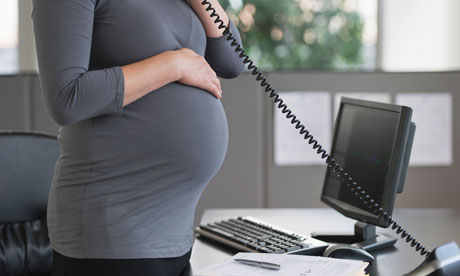Is hiring a pregnant woman risky business?
I’ve said it many times before; one of the key elements of undertaking an arduous job hiring process is to reduce risk. The risk of a bad hire, in short. Now a bad hire may be someone who lack skills, has an attitude that negatively infects other staff, doesn’t understand the job role, is perpetually absent, refuses to adapt to change, has a high rate of error and so on and so on. Pregnancy doesn’t come into the frame, yet many employers would see the recruitment of a pregnant woman as high risk. Trying to put your biasness aside, would you hire a woman who is with child if she were the best candidate for your organisation?
I’m certain I have already stirred up a debate here, but I want to know where you all stand on hiring a pregnant woman. Yes, we all understand that legislation makes this decision for us in that it makes it illegal to discriminate against a job candidate that is pregnant or has a pregnancy related condition, but can you honestly tell me that knowing a candidate is pregnant it would not be taken into account when making your hiring decision? Understandably performing the tasks of some job roles would result in jeopardising the health and wellbeing of a mum-to-be and her unborn child, yet could you not shuffle the role’s responsibilities for a short period of time? After all, with the exception of a short term contract, don’t we hire for the long term?
When an employee is temporarily unable to carry out the functions of their job, an employer is obligated to modify their employee’s job responsibilities. For example, when a delivery person has suffered a broken arm and cannot lift heavy loads, they may find themselves carrying out light office duties until they make a full recovery. Likewise a heavily pregnant woman who cannot stand for long periods of time, as her job demands, needs to be allowed to perform alternate assignments, adjust her tasks, take disability leave or leave without pay until her child is born. And this generally is not an issue for most employers, however some are not so receptive in making this exception for a newly hired pregnant woman. Is this because most pregnant job seekers don’t reveal their pregnancy until after they have been offered the job role?
Granted it is not great practice to begin a working relationship under the guise of deception. Employers will feel cheated if their new recruit waited until after their successful hire to reveal their pregnancy. Yet I can understand why many women would be reluctant to divulge their condition during the recruitment process. Many fear they will be discriminated against and not be awarded a job role, even if they are the best candidate for the position. And with multiple surveys across the globe revealing that only about five percent of employers would knowingly hire a pregnant recruit, who can blame an expecting, job seeking woman for keeping her news a secret? In fact, it is not uncommon for a hiring company to take into account a woman’s age, marital status and likelihood of having a family when determining if they should offer them a job role.
Taking a short term focus by fixating on avoiding the costs and inconveniences of hiring someone who in several months will be on leave, possibly up to twelve months, could see an employer passing over a candidate that is very faithful. Hmm. I want you to imagine for a moment that you hired a pregnant woman. Treated her the same as any other pregnant, long term employee. Put into effect contingency plans to cater for her absence over the maternity leave period. What do you think happens when she returns to work? I think it goes a little something like this…she returns and is so grateful for your considered approach to her life changing experience that not only is she a very satisfied employee, but she loves her job, respects her boss and goes the extra mile again and again for you as she is so thankful for the opportunity you extended her. Consequently she continues to pay you back with many years of loyal service. As a top performing employee, the value of her contributions over time far outweigh the short term pain of managing her absence during the maternity leave phase. Food for thought, huh?
It is fair to say that recruiters need to stay focused on a candidate’s level of skills, experience and attitude when it comes to job hiring. And while unconscious bias often rears its ugly head throughout the job recruitment process, the continued promotion of equal employment policies can help to reverse this. After all, can you really afford the legal costs of a successful, or even failed, job discrimination lawsuit?
There are pros and cons to all situations and this one is no exception. And while legislation guides us in keeping our moral compass on track, in these circumstances we often find ourselves conditioned to our prejudices and taking a short term focus. Yes hiring a pregnant job applicant will have its challenges, but if managed intelligently your organisation can reap many years of benefits. So I ask, where is the risk in that recruitment decision?








